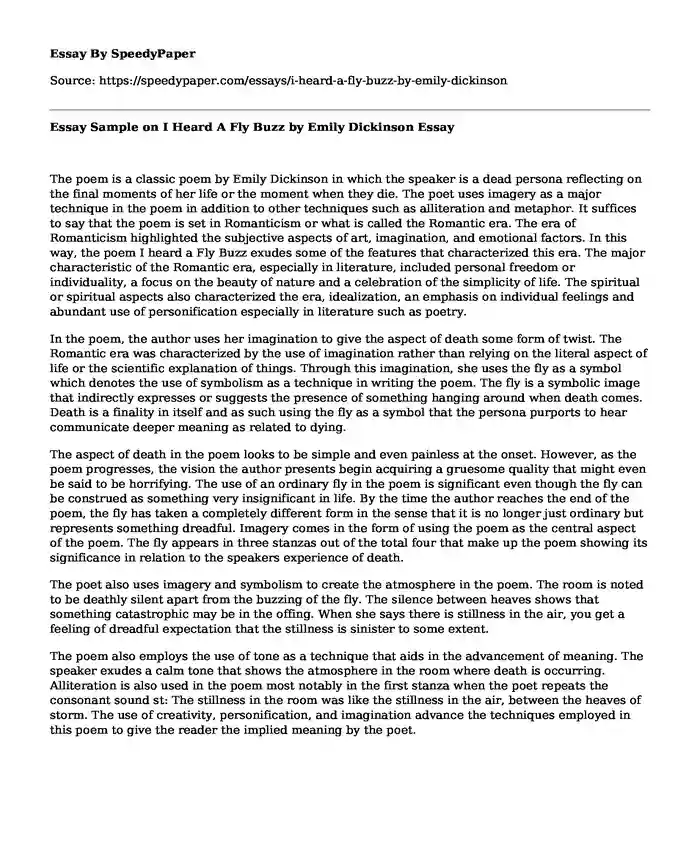
| Type of paper: | Essay |
| Categories: | Poem Literature Emily Dickinson |
| Pages: | 3 |
| Wordcount: | 576 words |
The poem is a classic poem by Emily Dickinson in which the speaker is a dead persona reflecting on the final moments of her life or the moment when they die. The poet uses imagery as a major technique in the poem in addition to other techniques such as alliteration and metaphor. It suffices to say that the poem is set in Romanticism or what is called the Romantic era. The era of Romanticism highlighted the subjective aspects of art, imagination, and emotional factors. In this way, the poem I heard a Fly Buzz exudes some of the features that characterized this era. The major characteristic of the Romantic era, especially in literature, included personal freedom or individuality, a focus on the beauty of nature and a celebration of the simplicity of life. The spiritual or spiritual aspects also characterized the era, idealization, an emphasis on individual feelings and abundant use of personification especially in literature such as poetry.
In the poem, the author uses her imagination to give the aspect of death some form of twist. The Romantic era was characterized by the use of imagination rather than relying on the literal aspect of life or the scientific explanation of things. Through this imagination, she uses the fly as a symbol which denotes the use of symbolism as a technique in writing the poem. The fly is a symbolic image that indirectly expresses or suggests the presence of something hanging around when death comes. Death is a finality in itself and as such using the fly as a symbol that the persona purports to hear communicate deeper meaning as related to dying.
The aspect of death in the poem looks to be simple and even painless at the onset. However, as the poem progresses, the vision the author presents begin acquiring a gruesome quality that might even be said to be horrifying. The use of an ordinary fly in the poem is significant even though the fly can be construed as something very insignificant in life. By the time the author reaches the end of the poem, the fly has taken a completely different form in the sense that it is no longer just ordinary but represents something dreadful. Imagery comes in the form of using the poem as the central aspect of the poem. The fly appears in three stanzas out of the total four that make up the poem showing its significance in relation to the speakers experience of death.
The poet also uses imagery and symbolism to create the atmosphere in the poem. The room is noted to be deathly silent apart from the buzzing of the fly. The silence between heaves shows that something catastrophic may be in the offing. When she says there is stillness in the air, you get a feeling of dreadful expectation that the stillness is sinister to some extent.
The poem also employs the use of tone as a technique that aids in the advancement of meaning. The speaker exudes a calm tone that shows the atmosphere in the room where death is occurring. Alliteration is also used in the poem most notably in the first stanza when the poet repeats the consonant sound st: The stillness in the room was like the stillness in the air, between the heaves of storm. The use of creativity, personification, and imagination advance the techniques employed in this poem to give the reader the implied meaning by the poet.
Cite this page
Essay Sample on I Heard A Fly Buzz by Emily Dickinson. (2019, Oct 04). Retrieved from https://speedypaper.net/essays/i-heard-a-fly-buzz-by-emily-dickinson
Request Removal
If you are the original author of this essay and no longer wish to have it published on the SpeedyPaper website, please click below to request its removal:
- Essay Example on Women Exercising While Pregnant
- Free Essay: Challenges Faced by the USAID in Relation to Geographically Dispersed Multicultural Workforce
- Essay Example about Korean Food Culture
- Unlock Creative Potential in the Workplace: A Modern Approach
- Slavery as the Main Cause of the Civil War. Paper Example
- Biography of Dame Iris Murdoch: British Novelist and Philosopher
- Essay Sample on the Story of Los Vendidos and a Death of a Salesman
Popular categories




